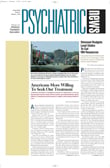Who were the professionals who helped prepare the Institute of Medicine report for the National Aeronautics and Space Administration (NASA) on how to safeguard the mental and physical health of astronauts sent on long-term space missions?
They were physicians specializing in neurology, emergency medicine, gynecology, rehabilitation medicine, or other disciplines. They were former astronauts. They were scientists who have explored humans’ mental and physical health needs in Antarctica and other harsh terrestrial environments. Among them were Douglas Powell, Ph.D., a clinical instructor in psychology at Harvard Medical School, and Joseph Brady, Ph.D., director of the Behavioral Biology Research Center at Johns Hopkins University—and APA Medical Director Steven Mirin, M.D.
The reason Mirin became involved in the report’s development, he explained during a recent interview with Psychiatric News, is that he was serving on the Institute of Medicine’s Board of Neuroscience and Behavioral Health. The board consists of both Institute of Medicine members and nonmembers who have expertise in the domains of neuroscience and mental and behavioral health and who are prepared to assist various Institute of Medicine committees when they need help in those arenas. Thus, Mirin served as a liaison from the Institute of Medicine Board on Neuroscience and Behavioral Health to the Institute of Medicine Committee on Creating a Vision for Space Medicine During Travel Beyond Earth Orbit. This was the committee that drafted the report.
Mirin said that he finds it very interesting that mental/behavioral health problems, along with bone loss and radiation exposure, are identified in the institute’s report as the three major health risks that astronauts will face on their voyages into deep space. He also said that he anticipates that research to answer questions about these mental/behavioral health risks, as well as how to counter those risks, will be conducted not on space shuttle missions, which last one to two weeks, but rather on the International Space Station, where people stay for months at a time.
“We don’t know exactly when NASA is planning to send a manned spacecraft to Mars,” Mirin noted. “But I think NASA certainly anticipates sending spacecraft on extended missions not just to Mars, but to other destinations as well. So NASA’s ability to plan and carry out long-range missions successfully really depends on developing both a research agenda and a health care system that can support the flight crews for those sorts of missions.”
This report from the Institute of Medicine will be able to provide NASA with guidance in developing that research agenda and the necessary health care infrastructure, Mirin said.
